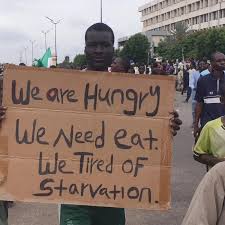
#ENDHUNGER Protest In Nigeria, The Good, The Bad And The Takeaway
Organizers of the #EndHunger protests carried out their threat on August 1, 2024, leading protests alongside other Nigerians against hunger, hardship, and President Bola Tinubu's economic policies.
According to observers, signs of growing national discontent had emerged in the days leading to the protests, causing anxiety in the Federal Government. In response, state governors and ministers held emergency meetings to prevent the planned August 1 protest, trying to suppress the campaigns and avoid a breach of public order.
On July 31, 2024, it was reported that the Lagos State Government had secured a court order restricting the protests to Gani Fawehinmi Park in Ojota and the Peace Park in Ketu.
The protests disrupted economic activities in many parts of the country, with businesses, banks, shopping centres, and some markets closing on Thursday due to fears of looting and violence, which later erupted during the demonstrations, particularly in some northern states.
In the following days, more than 17 people were reported dead in Kano, Niger, Borno, Kaduna, Jigawa states, and Abuja during the #EndBadGovernance mass demonstrations. One person was shot dead in Abuja and Kano, two were killed in Jigawa, six others were reportedly shot by security forces in Niger, while four died in Borno and three in Kaduna.
The Organised Private Sector and economic experts lamented the harmful impact of the nationwide hunger protests on the Nigerian economy, anticipating that investors may suspend their investments due to the ongoing unrest in Nigeria.
The Lagos Chamber of Commerce and Industry President, Gabriel Idahosa, stated that the protests would erode business confidence in Nigeria. Idahosa expressed concerns about long-term investments, as investors remain uncertain about the future economic situation.
Similarly, the Director of the Centre for Promotion of Private Enterprise, Dr Muda Yusuf, denounced the protests' effects. Yusuf criticized the shutdown of major sectors driving the Nigerian economy, including financial services, maritime, trade and commerce, transportation, entertainment, ICT, and hospitality, within the first four days of the protest.
Yusuf urged the organizers of the protests to halt the exercise to prevent a complete breakdown of law and order.
The Director-General/Chief Executive of the Nigeria Employers’ Consultative Association, Mr Adewale-Smatt Oyerinde, urged the government to address the challenges confronting the private sector during this opportunity.
Many lessons can be drawn from the protests, including government actions, the actions of the protest organizers, the protesters themselves, and those who remained neutral. Each person's analysis and opinions may vary, making a comprehensive assessment impossible.
Nigeria's economic reforms have become routine, with every government implementing one or more economic reforms. It is crucial to examine these.
President Tinubu issued a mass appeal, promising that his administration was already working to address the demands of the restless masses.
Within less than 48 hours before the planned mass action, Tinubu established centers nationwide where Nigerians could purchase a 50kg bag of rice for N40,000.
Recall the Nigerian Communications Commission directed telecommunications operators to immediately reinstate all blocked phone lines due to the lack of National Identification Number-SIM card linkage.
The President also directed the Nigerian National Petroleum Company Limited to sell crude to the Dangote Refinery and other upcoming refineries in naira.
The Federal Government also revealed the Youth Internship Scheme initiated by the NDDC for 10,000 youths of the Niger Delta region and approved N50,000 monthly stipends for them.
The government needs to acknowledge that its economic policies have not been effective, as reflected in the worsening living conditions of the citizens. The policies primarily benefit the leaders, who are growing wealthier, living in opulence, and unaware of the precarious conditions of the underprivileged.
This is the first and most significant takeaway.

